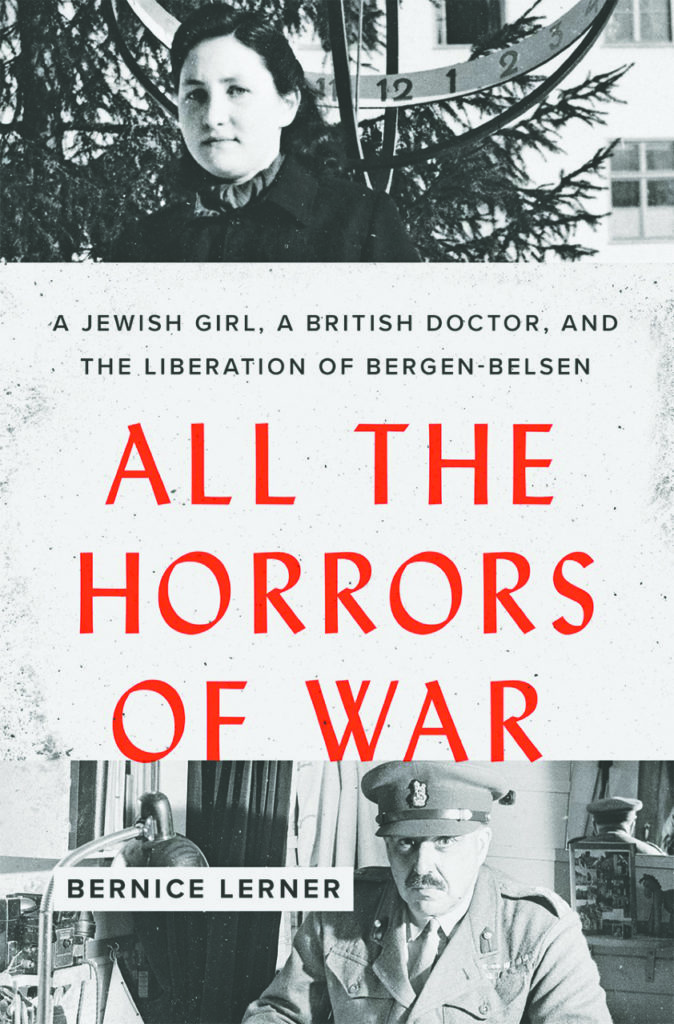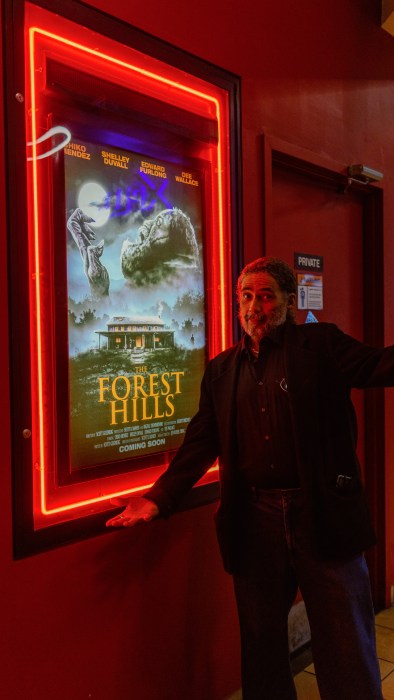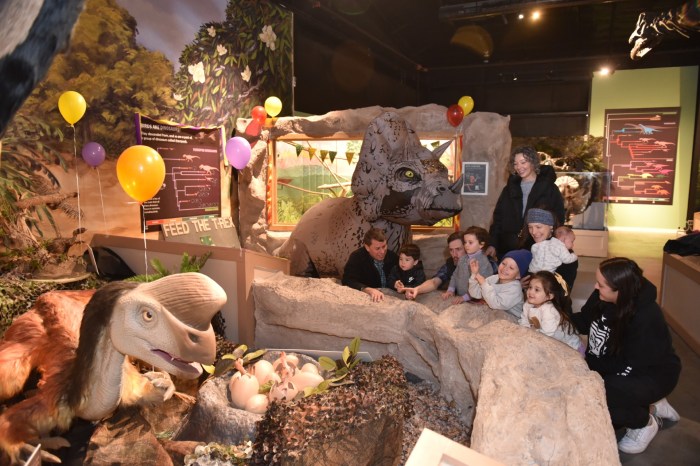New book goes in-depth with a Holocaust trauma

The liberators of Nazi death camps didn’t know what they were about to see as they began the liberation process. The prisoners, many of whom were barely alive, had no clue who these people were.
Had the war ended? Where were these people from? Where would they go next?
These questions and plenty of other important ones are answered in a new book by Bernice Lerner, the daughter of Ruth Mermelstein (née Rachel Genuth), a survivor of the most brutal days of the Holocaust. Genuth and her sister Elizabeth did everything they could to survive, leaning on each other’s strength as they each had multiple close calls with death throughout their journey from Sighet, Transylvania to Auschwitz, and then to Belsen by foot in the last year of the war.
All the Horrors of War: A Jewish Girl, a British Doctor and the Liberation of Bergen-Belsen, published by Johns Hopkins University Press, throws readers right into the trenches. In the 280-page book, Lerner, a senior scholar at Boston University’s Center for Character and Social Responsibility, walks readers through the difficult life of her mother, adding a personal touch to her life in Sighet before and during the war. The author details the post-war struggles once Berger-Belsen was liberated, led by British Brigadier Hugh Llewellyn Glyn Hughes, a man who spearheaded efforts through the Royal Army Medical Corps, combining both sides of the late stages of World War II.
Lerner discusses the journey of writing this incredibly-detailed book, how she combined the paths of Hughes and her mother, who now lives on Long Island, as well as much more.
 What inspired you to write this book now?
What inspired you to write this book now?
 Because of the 75th anniversary of the liberation, there’s been a lot of buzz in talking about it. This is a book that’s important for the historical record. It discusses two human beings, one who was famous in certain circles and one who’s my mother. For my mother’s side, I wanted to commemorate some of the people who were in her life and just vanished from the face of the earth—no record of them and no knowledge of them. As far as Glyn Hughes, I originally started the project wanting to write his biography. I wanted to figure out exactly how my mother survived, because she had fallen unconscious at the end of the war and I didn’t know the details of her rescue. That led me to Glyn Hughes, who’s prominently associated with the liberation at Bergen-Belsen. Who was this man? What kind of character was he? What did he bring to the experience? What did he come away with? How did he go about his unbelievable, unprecedented job? He became a really close friend to survivors for the rest of his life and a champion of the State of Israel. He should be well-known as much as Oskar Schindler. I started out to write a biography on him, went to England, met his daughter before she died, spoke to his son and found everyone I could who knew him and could tell me something about him. I had this idea that morphed into two lives from opposite ends of Europe, who are traveling during the last dramatic year of the war from the east and the west, arriving at the same place.
Because of the 75th anniversary of the liberation, there’s been a lot of buzz in talking about it. This is a book that’s important for the historical record. It discusses two human beings, one who was famous in certain circles and one who’s my mother. For my mother’s side, I wanted to commemorate some of the people who were in her life and just vanished from the face of the earth—no record of them and no knowledge of them. As far as Glyn Hughes, I originally started the project wanting to write his biography. I wanted to figure out exactly how my mother survived, because she had fallen unconscious at the end of the war and I didn’t know the details of her rescue. That led me to Glyn Hughes, who’s prominently associated with the liberation at Bergen-Belsen. Who was this man? What kind of character was he? What did he bring to the experience? What did he come away with? How did he go about his unbelievable, unprecedented job? He became a really close friend to survivors for the rest of his life and a champion of the State of Israel. He should be well-known as much as Oskar Schindler. I started out to write a biography on him, went to England, met his daughter before she died, spoke to his son and found everyone I could who knew him and could tell me something about him. I had this idea that morphed into two lives from opposite ends of Europe, who are traveling during the last dramatic year of the war from the east and the west, arriving at the same place.

 The fact that you combine these two stories makes it unique among Holocaust-based books. But how difficult was it to write about your mother’s journey?
The fact that you combine these two stories makes it unique among Holocaust-based books. But how difficult was it to write about your mother’s journey?
A It was difficult and that’s why I thought about doing it for so many years. It was hard in different stages of my life when you take a leap from the moral imagination and try to put yourself in someone’s shoes, I kept thinking about my grandmother with young children, not being able protect them and being killed. Now, I’m a grandmother and I think about my mother’s grandmother. It was very painful and I didn’t want to go there. I tried to get into her head from her point-of-view and his head from his point-of-view.
 What was your process like in digging up information on Glyn Hughes?
What was your process like in digging up information on Glyn Hughes?
A I actually had to cut out a lot about what I found out about him. I became immersed in his life. He rose from very poor circumstances, being a very sick kid, to being this war hero. I really dug deep. The danger, when you’re a biographer, is going down the primrose path. I went to England and saw his whole life flash before me. I went to the medical school where he went and I dug up his transcripts. I found out everything I could about him, reading everything that he wrote. The process is like a detective, searching for clues and trying to find what will be of interest for a reader.
 What was your mother’s reaction when you told her you’re writing this book?
What was your mother’s reaction when you told her you’re writing this book?
A I kept her in the loop every step of the way. I took my chances, in a way. I’m getting older and she’s getting older. I’m very grateful that we’re both alive to see this be officially published.
 What’s the biggest takeaway you want readers to get out of this book?
What’s the biggest takeaway you want readers to get out of this book?
A The humanity, seeing the stranger and seeing a person who came from a different background than you. The thing about Glyn Hughes is that he saw the horrors of war, but when he went into Bergen-Belsen, he was breaking down, crying. He was a doctor at heart, and he really saw the suffering of human beings. Something happened a couple of months after the liberation. He was done with his service, but he kept going back to the displaced persons camp in Bergen-Belsen, seeing how nutrition and care helped personalities shine. He could see the survivors’ little community in the displaced persons camp in Bergen-Belsen. It was a major turning point in his life. At his funeral, he asked the rabbi who was in Bergen-Belsen to say a prayer for the martyrs from Belsen. He saw himself as their liberator. It was so easy for the liberators to look at them [the survivors] as what they were reduced to. He was a humanitarian. Can we all aspire to be like that?
All the Horrors of War will be available starting on April 14 on Amazon.com.






























